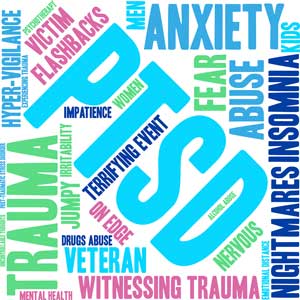
Is the cause of PTSD simply a traumatic event?
Although post-traumatic stress disorder (PTSD) begins after a traumatic event, other factors also play an important role. The severity, type, and circumstances of the traumatic event may determine whether or not a person develops PTSD.
In addition, some individuals appear to be more vulnerable to PTSD. It is possible that underlying differences in the makeup of a person’s personality or brain physiology may contribute to the onset of PTSD.
What are the specific symptoms of PTSD?
The symptoms for posttraumatic stress disorder are fairly complex, and so are described in detail on our PTSD Symptoms page.
Should people with PTSD be encouraged to talk about the trauma?
Providing the person with PTSD with support, and with the freedom to talk, is of course valuable. Furthermore, an important component of the psychotherapy for PTSD is reprocessing of the traumatic event.
Nevertheless, it is important to allow people the opportunity to proceed at their own pace; revisiting traumatic events may be extremely painful. Thus, people should avoid encouraging a person with PTSD to talk about trauma until he is ready to do so.
What about PTSD following a single event?
We wrote an article about how PTSD can develop even after a single traumatic incident.
What is the best treatment of PTSD?
Psychotherapy with an experienced PTSD clinician is a very important component of the treatment of PTSD. In particular, a structured form of psychotherapy know as cognitive-behavioral therapy (CBT) is the most widely accepted as effective for PTSD. Sometimes it is useful to work one-on-one with a therapist through individual therapy. Working together with others who have also suffered traumatic experiences in a group therapy setting may also be helpful. Certain medications may also be very useful in reducing many of the symptoms of PTSD.
What other types of treatment are available for PTSD?
Given the amount and complexity of treatments available for posttraumatic stress disorder, we’ve listed all the various types of treatment for PTSD here for your convenience. In addition to medications, psychotherapy is a valuable treatment for PTSD.
What is the prognosis of PTSD?
The prognosis of PTSD differs from individual to individual. Some people can experience a remarkable return to normal functioning. Others experience persistent, fluctuating symptoms of the disorder. Fortunately, specific medications and/or psychotherapies may often result in a substantial reduction in the symptoms of PTSD, and in an improved quality of life.
What are some other common myths and facts about PTSD?
We’re glad you asked. Check out our guide to PTSD myths and facts here.
